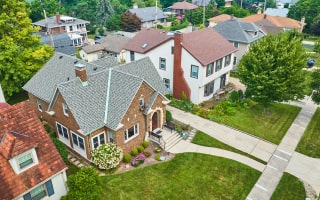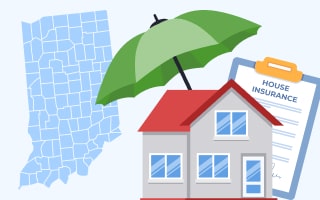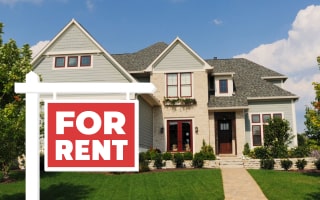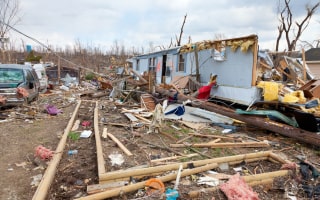Homeowners Insurance in Indiana

Indiana, home of the famous Hoosiers, is located in the Midwest, which means the state experiences tornadoes, earthquakes, summer storms, harsh winters with ice and heavy snow, and wildfires. Extreme weather events can severely damage or destroy property, which means insurance claims. Since 1953, Indiana has seen 48 federally declared natural disasters, and the rate of disasters per 1 million residents is 6.96.
Wind and hail account for most home insurance claims in Indiana. However, in addition to violent weather events, residents must also deal with frozen pipes and water damage, theft, vandalism, and liability issues.
Like all other states, Indiana does not require property owners to carry insurance on their property. However, experts strongly suggest everyone who owns a home should have at least some coverage. However, if you have a mortgage on the home, your lender will require that you purchase and keep coverage on the house until the loan is paid off. Your financier will dictate the level of coverage you need, and you must comply.
According to researchers, the current national average for homeowners insurance is $2,511/year or $209/month. State Farm Insurance tends to have the best rates across the country. The average rate for homeowners insurance in Indiana is $2,991, which is quite a bit more than the national average due to the extreme weather conditions.
Types of Homeowner Insurance Coverage Available in Indiana
Depending on where you live, you will have a choice of insurance providers and types of coverage available to you. The most common types of homeowners insurance available in Indiana include:
-
Dwelling Coverage: Dwelling coverage protects the structure of your home and replaces or repairs it after a qualifying event. Your roof, walls, foundation, and other structural elements are included.
-
Liability Coverage: If someone gets injured while on your property and sues you, your liability coverage will kick in and pay your legal fees.
-
Medical Payments: If someone gets hurt on your property, medical payments coverage will pay their medical bills.
-
Personal Property Coverage: Personal property pays to replace your personal belongings if they are destroyed or stolen. It covers furniture, clothing, sports equipment, and electronics.
-
Other Structures: Other structures coverage pays to replace detached items like a pool, fence, garage, or shed.
-
Additional Living Expenses (ALE): If a disaster occurs and you must leave your house while it is repaired, ALE insurance will pay for your lodging, food, transportation, pet expenses, etc.
Home Insurance and Natural Disasters
It should come as no surprise that global warming and climate change are causing dangerous weather conditions throughout the nation. This severe weather greatly impacts the home insurance industry. Storms and wildfires affect claims and losses more than any other issue. Across the board, insurance rates have increased by 34% and as high as 60% in some areas. Indiana saw increases of 25.1% from 2018 to 2023, which is lower than the average.
Indiana is prone to extreme summer and winter storms, tornadoes, earthquakes, and wildfires. From 1980 to 2024, it experienced 96 billion-dollar disasters. Thirty-four percent of insurance claims are for wind and hail damage, two of the most common factors in Indiana. A single claim for wind or hail damage costs insurers $11,695. Water damage and freezing costs insurance providers $11,650 per incident. From 2015 to 2019, Indiana incurred home insurance losses of $981,446,200. In 2023, Indiana had 51 tornadoes, causing five deaths. In 2022, Indiana had 49 wildfires, causing 1,643 acres of damage.
Although Indiana doesn't experience many floods, some carriers offer this type of insurance to residents.
FEMA (Federal Emergency Management Agency) manages the National Flood Insurance Program (NFIP) through a network of 50 providers across the U.S.
Since most homeowners insurance does not cover floods, this supplemental coverage can repair damage and replace items after a flood. Depending on the options you choose, it can cover the building and/or your personal belongings. This program is available to homeowners, renters, and businesses. Learn more about the program on FEMA's website.
How Can I Save on Homeowner Insurance Premiums in Indiana?
Home insurance can be costly in states like Indiana, so looking for ways to lower your rates makes sense. Before you can cut expenses, you must understand the factors that affect pricing; they are as follows:
-
Location: The most significant factor affecting price is where your house is located. Your rates will be higher if you live in an area prone to extreme weather or high crime.
-
Size, Age, & Condition of Your Home: Your home's size, age, and condition are also factors. The larger and older the home, the more you will pay for insurance. The newer and better the condition of your home, the less you will pay.
-
Materials: The more expensive the materials used to construct your home, the higher your premiums will be.
-
Your Credit Score: People with good credit scores are seen as "low risk" and will get better rates than those with poor credit.
-
Deductible Amount: The higher the deductible, the lower the rates. The more risk you assume, the less your insurer must pay.
-
Levels of Coverage: The more coverage you opt for, the more you will pay on home insurance.
-
Claims History: If you have a lot of claims (even little ones), you will pay more for insurance.
In Indiana, you will want to save as much as you can. Since the weather can be unpredictable and cause damage, you should first replace your roof, siding, and windows with storm-resistant materials; it could save you a lot of money on your insurance. Some other ways to save are:
- Bundle Insurances: When you bundle multiple policies with the same carrier, they usually cut your rates.
- Fix Your Credit: Improve your credit and then let your insurer know it has improved. They may reduce your rates.
- Ask for Discounts: Ask your insurance agent how to get discounts. You might have to sign up for paperless billing or automatic payments.
- Install Security/Safety Features: Install a security system to keep your home safe and reduce rates. Fortify your house with smoke alarms, fire extinguishers, and sprinklers to minimize fire risk and get discounted insurance fees.
- Don't File Small Claims: Fix small stuff yourself and save your claims for the big stuff.
- Raise Your Deductible: Increase your deductible as much as possible to lower your rates.
Home Insurance Discounts in Indiana
Home insurance covers your home, personal belongings, and other assets if they are damaged, destroyed, or stolen in a covered event. Homeowners purchase home insurance to help protect and replace their homes, if necessary, after a disaster. It also pays for legal and medical bills if someone gets hurt on your property and pays your expenses if you are displaced from the home.
You can obtain an insurance policy in many ways. The top insurers all have websites where you can fill out a form and get a quote. Most of them also offer an 800 number you can call to apply. You can also visit a local agent to get help determining how much coverage you need. Regardless of how you get your policy, you must pay the first year in advance. Afterward, you can bundle the monthly payments with your mortgage escrow or pay once a year.
Some of the most common discounts offered by home insurance companies include:
- Claims Free: If you have a clean claims history, you will receive discounts on your home insurance.
- Safety Discounts: You can get discounts if you install a security system or have other safety/security features that help prevent claims.
- New Home Discounts: Some carriers offer discounts to new construction homes or first-time buyers.
- Early Quote: If you get a quote much earlier than needed, you might qualify for a discount.
- Military Discounts: Active or retired military personnel usually get discounted rates from insurance firms.
- New Roof or Restoration Discounts: If you replace your roof with a much sturdier one or restore your home, you can earn discounts for upgrades.
Common Rates Offer by Homeowners Insurance Firms
New construction homes cost less to insure because they use modern, safer, code-compliant materials and will be easier to rebuild if they are destroyed. In some cases, new construction homes cost 40% less to insure. In Indiana, residents pay about $1,192 for home insurance, much less than older homes.
Top 10 Home Insurance Firms in Indiana and New Home Savings
| Company | % savings |
|---|---|
| Nationwide | 76% |
| State Farm | 51% |
| USAA | 54% |
| Travelers | 63% |
| Cincinnati Insurance | 52% |
| American Family Insurance | 55% |
| Allstate | 47% |
| Chubb | N/A |
| Auto-Owners Insurance | N/A |
| Indiana Farm Bureau | 42% |
Home Insurance and Renovations in Indiana

Significant upgrades and home renovations can turn your dreams into reality and make your home a castle. However, expensive upgrades can also strongly impact your homeowners insurance and increase your rates. Your rates could go up or down depending on what you do, and you may need extra coverage to protect these new areas.
![]() Home Renovations that Increase Rates
Home Renovations that Increase Rates
Some home renovations that increase your rates include:
- Building an Addition: Adding space to your home is nice but could mean more expensive home insurance. More space will cost more to replace.
- Solar Panels: Solar panels are a great way to save thousands on electricity, but they could increase your insurance because they are pricey. Replacing them could be costly.
- Adding a Fireplace: Adding a fireplace enhances the beauty and warmth of your home but also raises your risk of fire and your insurance rates.
![]() Home Renovations that Decrease Rates
Home Renovations that Decrease Rates
Some home renovations that decrease your rates include:
- Replace Your Wiring: Old wiring is a fire hazard, and replacing yours could save your home from disaster and save you money on your premiums.
- Install Security/Safety Features: Installing security or safety features can help avoid costly claims and losses and could save you money on your insurance rates.
- Make Your House Storm-Resistant: Adding hurricane straps or ties, impact-resistant shingles or siding, and storm-safe windows could significantly reduce your home's risk and lower your insurance rates.
Adding new siding to your home could lower your rates if it is weather-resistant, but if it uses expensive materials, it could increase your rates.
Regular home improvements that you choose are not covered by homeowners insurance. Insurance pays only to replace or repair your home after a qualifying event. If you need to upgrade your house for routine maintenance or improve the style of outdated materials, you must pay for those yourself. However, you are covered if a worker gets hurt or breaks something during a renovation.
Speaking with your insurance agent before beginning any major renovation is always best. Find out how the work will impact your rates and coverage. You will probably need them to come out and do an inspection and increase your coverage after completion.
Indiana Renters' Insurance

Indiana renters insurance covers people who live in rented properties like condos, apartments, and houses. It is similar to homeowners insurance but differs slightly. First, it does not include any dwelling coverage. It will not repair or replace the structure of your home if something happens to it. That must be covered under the owner's policy. It does cover your personal belongings, liability, medical payments, and loss of use. Its primary focus is your personal belongings. There are limits; if you have expensive items, they might not be covered. Typically, renters insurance also covers theft if your items are stolen.
Insurers price renters insurance according to three variables:
-
Location: People who live in safe areas with low crime and very few natural disasters will pay less than those living in more dangerous areas.
-
Coverage: The more coverage you have, the higher your premiums will be.
-
Number of Units: The more units in your building, the lower your premiums.
The typical renters insurance rate in Indiana is $14.50/month, or $174/year which is very affordable but more than the national average of $148/year. People in urban areas will see higher rates than those in suburban areas.
Condo Insurance in Indiana

Condo owners also need homeowners insurance. Condo insurance is slightly different and is designated as a H0-6 policy. The biggest difference is in the dwelling coverage. Condo developments have a master policy that covers each building and will restore it back to its original state (when first built). However, that will not cover any upgrades that have been made to the property, such as new kitchens, baths, flooring, appliances, and fixtures. The owner's HO-6 policy picks up where the master policy leaves off and covers those upgrades, restoring it to its most current condition. Condo insurance also includes personal belongings, liability, medical payments, loss of use, and loss assessment coverage.
The biggest difference between condo and renters insurance is that renters insurance has no dwelling coverage. Condo insurance does, but it is limited to "interior only". Another difference is that if someone gets hurt on your property, it must be inside the condo to qualify for liability insurance payments.
Condo insurance covers fires, theft, and damage due to storms (hurricanes, tornadoes, windstorms, and earthquakes). Some of the things it will pay to replace are:
- Appliances
- Furniture
- Fixtures
- Flooring
- Interior Walls
- Wiring
- Plumbing
- Countertops
- Cabinets
- Personal Belongings
The average rate for condo insurance in Indiana is $39/month or $470 a year. The national average is between $400 and $700, so Indiana falls right in that range.
Some ways to save on condo insurance are:
- Ask For Recommendations and Shop Around
- Raise Your Deductible
- Keep Your Credit Score High
- Bundle Your Home and Auto Policies
- Install a Security System
- Ask for Discounts
Indiana Home Insurance Market
Indiana's home insurance market held its own for a long time until 2023 when it suffered huge losses due to seven billion-dollar disasters. The industry as a whole is in tough shape, with 18 states incurring losses in 2023, up from only eight the previous year. Increasingly violent weather sets the stage for future claims and even more losses in upcoming years. In some states where losses continue, providers stop offering insurance.
Although Indiana is not the worst state in terms of home insurance losses, it has continued to suffer from tornadoes, wildfires, and harsh storms, which wreak havoc on property and produce claims. If these trends continue, residents may begin to find it difficult to find coverage.
State agencies monitor and regulate home insurance. They ensure compliance with state laws, investigate customer complaints, sanction companies that violate the rules or mistreat customers, and review policy forms and rates. The agency in charge of regulation in Indiana is the Department of Insurance, located at 311 W. Washington St., Ste 300, Indianapolis, IN 46204.
Homeowners Insurance Guide
- Homeowners Insurance in Indiana
- Types of Homeowner Insurance Coverage Available in Indiana
- Home Insurance and Natural Disasters
- How Can I Save on Homeowner Insurance Premiums in Indiana?
- Home Insurance Discounts in Indiana
- Home Insurance and Renovations in Indiana
- Indiana Renters' Insurance
- Condo Insurance in Indiana
- Indiana Home Insurance Market
Instant Access to Indiana Property Records
- Owner(s)
- Deed Records
- Loans & Liens
- Values
- Taxes
- Building Permits
- Purchase History
- Property Details
- And More!
Homeowners Insurance Guide
- Homeowners Insurance in Indiana
- Types of Homeowner Insurance Coverage Available in Indiana
- Home Insurance and Natural Disasters
- How Can I Save on Homeowner Insurance Premiums in Indiana?
- Home Insurance Discounts in Indiana
- Home Insurance and Renovations in Indiana
- Indiana Renters' Insurance
- Condo Insurance in Indiana
- Indiana Home Insurance Market